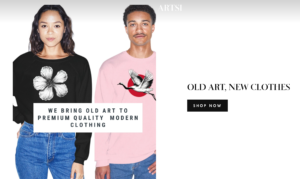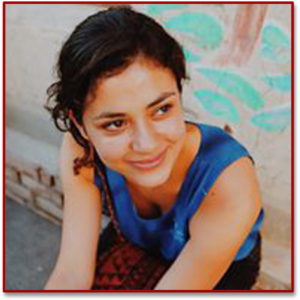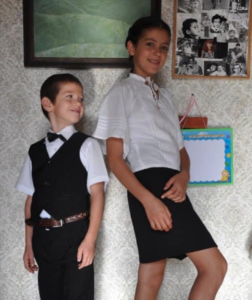Curb Spotlight: Mariyam Shamshidova

Curb Scholar Mariyam Shamshidova’s entrepreneurial spirit brought her to America. Writing Fellow Chris Ketchum caught up with Mariyam to talk about the business idea she’s been developing, her passion for eCommerce and how her experiences of growing up in Uzbekistan have led her to the path she is on today. First, Mariyam described her morning.
Mariyam Shamshidova: On top of taking classes, I’m working on developing my business idea and having meetings around that: potential investors, other founders, CEOs, anyone who has done what I want to do.
Chris Ketchum: I was going to ask about your business idea, so we might as well start now! What is it you’re working on?
MS: I started getting interested in eCommerce last year, and I helped my friends with some minor stuff. But I wanted to work on something that’s more aligned with my values, my interests. So I started developing this brand that takes art that’s in the public domain—later on, it’s going to be collaborations with specific artists—and brings it on fashion items. For now it’s just shirts, sweatshirts, and hoodies—the most basic ones—but I will expand as we go. I have been doing a lot of market research to find the right segment and researching suppliers a whole bunch. I also take time to delve into art research to keep myself inspired by this idea so that I can learn to share it with others.
CK: Have you started making products already?
MS: Yeah. My co-founder Jeremiah Woldabezgi has been really taking a lead on that. The way it works is that I am more focused on the longer-term picture of Artsi and he is more hands-on with the day-to-day tasks. It’s a really good way to balance our progress since we aren’t an established business yet. He made the website and found this very handy service called print-on-demand which means that the product is made once the order is placed. With print-on-demand we are not risking anything, because we don’t hold inventory. It’s also really unnecessary, because we don’t even know what’s going to be popular.
CK: What are some of the first pieces that you’ve designed?
MS: Jeremiah has a friend who is dabbling in design and she went with Japanese art for our first collection. I think it’s really cool, graphic and visually striking, so it doesn’t require as much editing or deciding, per se. Once we have a real designer we’ll definitely be working on more complex stuff. Complex in the sense that it takes more contextualization of an original piece to a particular fashion item.
My premise for this whole project is that there’s so much beautiful art out there in archives, or made by artists that are alive right now, that we don’t get to interact with it at all during everyday life. The underlying vision for the brand is to bring a little bit of beauty to an item that is very commonly used. You get to interact with it and see it on other people every day. It’s a beautiful idea that I am set on building a solid business out of. This vision appeals to people who are passionate about it, but it also works for people who are just looking to buy a cool shirt.
CK: You said you were talking to your parents about this concept. What’s their reaction?
MS: My parents aren’t as interested in the business as they are in my evolution as a person. They don’t really have any hopes for Artsi—they’re like “Oh, it will fail, so just make sure that you’ll be fine.” I think it’s meant to be this way. They’re not meant to be all excited by my ideas just because I am their daughter. Artsi is still more of a concept than a functional business. It’s not that they’re bad, or they’re not creative, or they can’t see potential. It’s just that they’re living their life. They didn’t spend their time imagining this project. So eventually my responsibility is to deliver this cool vision that I have to the people who would care, including my parents. I really want to create that Artsi experience for them.
CK: It sounds like your parents think of it as a bit of a pet project. But you see it as something that has real growth potential.
MS: Yeah. The more I look at it, the more I discover that it has huge potential. It’s just a matter of finding a scalable approach. There is a surplus of both old and new really great art. It’s a model that cannot not work—I just have to set up the business model that will make it work.
 CK: I wonder too about this interest in painting and visual art. Where does that come from, and how did that interest evolve for you?
CK: I wonder too about this interest in painting and visual art. Where does that come from, and how did that interest evolve for you?
MS: It started from an early age. I wanted to become an artist, but it was a dream that I was scared of. My whole surrounding wouldn’t take it well. Even personally, I wouldn’t take it, because I didn’t think I was talented enough. In Uzbekistan, where I’m from, it’s more traditional, and because I didn’t see a good traditional technique in my art, I really didn’t see a future… It felt guilty to be even considering it.
When I came here to Vanderbilt, I wanted to pursue film. But I had this wave of feeling like film was so impractical, and I’m an international student—I have to make money. So I started doing computer science. I kind of abandoned my art. Now, doing entrepreneurship, I’m coming back to, not art, but more so to daring dreams. The reason why I’m interested in art is it’s still very much in me, and so is this deep sense that I feel sad I’m not an artist. At the same time, I definitely see myself in entrepreneurship. So it’s like an expression of that dream I once had. If I’m being honest, I do wish that in some different reality I was an artist. But in this reality, I’m going to be an entrepreneur and I will become the very best. I’m going to attend to my artistic interests through this brand.
CK: I’m interested in hearing more about what it was like growing up in Uzbekistan, and how that influenced your decision to come to Vanderbilt. What was that path like?
MS: Since an early age, I set my eyes and my whole being on America, which was definitely pretty radical. I probably didn’t need to be so directed but I really was. For me, America was this grand vision of how everything is going to finally work, and I am going to have cool friends, have fun and have awesome projects. That direction drove me to get into the only International School in Uzbekistan on a full ride, and from there, come to Vanderbilt. Vanderbilt… it wasn’t really an intentional choice. It just kind of happened.
Growing up in Uzbekistan… I think it’s crucial for who I am. It’s a very different environment and growing up there really built my character. Resources are way more limited. There’s no credit score, for example. You buy a house when you can, or you buy a car when you save enough money. People don’t move to another state, they usually stay with their families. It’s definitely emotionally and mentally healthier, and it instilled those family-happiness values in me. At the same time the lack of opportunities forced me to be extremely ambitious. I think it’s a great trait for me even if it temporarily doesn’t make me very happy. I strongly desire building a great business, so naturally I’m not fully happy, not fully at peace with where I am now. So it’s a fuel that comes at a certain price. I would say my background gives me two valuable “assets”: deep appreciation of family, life for life’s sake and happiness and a mentality of really grabbing opportunities because there are so few. Here in America I had to unlearn and redirect that, because at any given point you have too many options. The mental battle here is to choose well, not to take whatever is offered. If you go to the dining hall, there’s always a dessert that you have to continue choosing to not eat, always something happening that would be too much for you.
CK: Did you see other young people in Uzbekistan find a way to balance those two things—the traditional family values of the culture, and their own ambitions?
MS: Uzbekistan is a post-Soviet country. It exited the Soviet Union in the 90s. Once the Soviet Union broke down, there were extremely large waves of people leaving to either Russia, Israel, or America. If you manage to go to America, it’s a huge step. Living in Uzbekistan, you always hear of people who are leaving, people who have left, people who are planning to leave. Continuously, people are leaving to look for a better life. Once they leave, they have a different life there.
I’m ethnically Jewish, so culturally I grew up a little bit different—but Uzbek families are very traditional. There’s a strong call to return home and be with your family. When I was leaving for America I didn’t think about these questions. I had a tunnel vision: I just need to get there. Being as ambitious as I am, I realized I can’t be in a small pond. After spending three years here now, I realize that being away is a continuous balance of family, happiness and work aspirations. It’s a question that never gets answered and needs to be answered daily.
I now realize how deeply lonely it is on the other side. I have amazing friends now, but it’s never the same as living with family. Yes, I am advancing myself so much, but it does come at a certain price of unhappiness and being unshielded by your family. This state creates tremendous motivation for me to build a life where I’m together with my family, and building businesses. But as of right now, it’s an intentional choice. My grandparents are getting older, but I’m here. I have to be here, they have to be there, I can come visit, but I am still overall spending less time with them.
CK: What does being a Curb Scholar contribute to your experience at Vanderbilt, and how does it help you combine your education with your business goals?
MS: It’s a place where it’s required to be creative, which reminds me of a persona that I have that I sometimes abandon. It’s a weekly reminder to attend to that part of my character. It reminds me and empowers me to be a little creative, which in the long term will translate to the way I do business uniquely, in a Mariyam way.
See Mariyam’s working prototype at ARTSI
Mariyam Shamshidova
Class of 2022
Engineering Science
Uzbekistan
